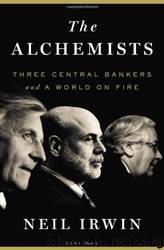The Alchemists: Three Central Bankers and a World on Fire by Neil Irwin

Author:Neil Irwin [Irwin, Neil]
Language: eng
Format: epub
Tags: Business & Economics, Economic History
ISBN: 9781101605806
Google: YermphJSixkC
Amazon: 1594204624
Publisher: Penguin
Published: 2013-04-04T00:00:00+00:00
FOURTEEN
The King’s Speech
The official name of the gathering is “The Lord Mayor’s Banquet for Bankers and Merchants of the City of London.” Everyone knows it, however, simply as the Mansion House Dinner, for the official residence at which it occurs, at the intersection of Threadneedle and Lombard Streets. For the grandees of British finance, it’s among the most important events of the annual calendar, an evening on which they don tuxedos, drink wine, and hear what the chancellor of the exchequer and the governor of the Bank of England have to say about the state of their world. For the speakers, it’s the highest-profile speech of the year, the one they use to broadcast their biggest ideas, ensuring that they’re heard not only by the financiers in the room, but also by the many more around the globe who know to pay particular attention to what happens at the lord mayor’s Corinthian-columned Georgian palace each June.
So it seemed rather odd, just two days before the 2009 dinner, when Mervyn King’s aides told Alistair Darling’s that the governor’s speech wasn’t yet finished. “This I found curious,” Darling said in his memoir. After all, King was known for his thoughtful, carefully reasoned speeches. He didn’t leave them to the last minute. When Darling finally received a copy of the talk, a couple of hours before it was to be delivered, he saw why King had been keeping it under wraps.
“It has been a quite a year,” King began, on a note of understatement. “A year to remember, but not to repeat.”
He gave a tour d’horizon of the crisis and its aftermath and expressed his view that “fiscal policy too will have to change,” to develop a “clear plan to show how prospective deficits will be reduced.” He then said a few things about how Britain’s regulation of the financial industry ought to change to reflect the lessons of the crisis. Noting that the Bank of England had rather limited powers to oversee the financial sector, a legacy of the Labour government’s 1997 reforms, he offered a rather deft metaphor to make his point: “The Bank finds itself in a position rather like that of a church whose congregation attends weddings and burials but ignores the sermons in between,” he said with a twinkle in his eye. “Experience suggests that attempts to encourage a better life through the power of voice is not enough. Warnings are unlikely to be effective when people are being asked to change behavior which seems to them highly profitable.
“So it is not entirely clear how the Bank will be able to discharge its new statutory responsibility if we can do no more than issue sermons or organize burials.”
The Bank of England, in other words, can’t just tell banks what to do. It needs some real power. Got that, Mr. Chancellor?
Darling got it all too well, as he sat on the dais trying with mixed success not to let his annoyance show to the hundreds of bankers staring at him.
Download
This site does not store any files on its server. We only index and link to content provided by other sites. Please contact the content providers to delete copyright contents if any and email us, we'll remove relevant links or contents immediately.
International Integration of the Brazilian Economy by Elias C. Grivoyannis(111059)
The Radium Girls by Kate Moore(12028)
Turbulence by E. J. Noyes(8049)
Nudge - Improving Decisions about Health, Wealth, and Happiness by Thaler Sunstein(7706)
The Black Swan by Nassim Nicholas Taleb(7129)
Rich Dad Poor Dad by Robert T. Kiyosaki(6632)
Pioneering Portfolio Management by David F. Swensen(6300)
Man-made Catastrophes and Risk Information Concealment by Dmitry Chernov & Didier Sornette(6019)
Zero to One by Peter Thiel(5802)
Secrecy World by Jake Bernstein(4753)
Millionaire: The Philanderer, Gambler, and Duelist Who Invented Modern Finance by Janet Gleeson(4478)
The Age of Surveillance Capitalism by Shoshana Zuboff(4292)
Skin in the Game by Nassim Nicholas Taleb(4248)
The Money Culture by Michael Lewis(4207)
Bullshit Jobs by David Graeber(4190)
Skin in the Game: Hidden Asymmetries in Daily Life by Nassim Nicholas Taleb(4006)
The Dhandho Investor by Mohnish Pabrai(3765)
The Wisdom of Finance by Mihir Desai(3747)
Blockchain Basics by Daniel Drescher(3582)
